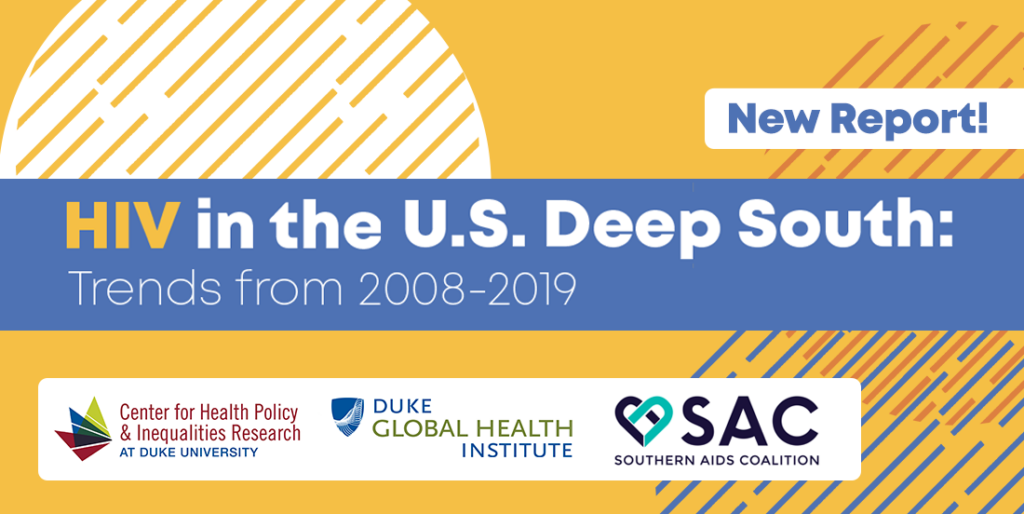White House Office of National AIDS Policy Director Harold Phillips
Highlights Southern HIV Epidemic and Seeks Community Support at SHAAD 2021
Birmingham, Ala., (August 19, 2021) — The Southern AIDS Coalition (SAC), in partnership with the White House Office of National AIDS Policy and the Center for Health Policy and Inequalities Research at Duke University is calling attention to the southern HIV epidemic. SAC’s 3rd annual Southern HIV/AIDS Awareness Day (SHAAD), being held Aug. 20, is focusing on the fight to end the HIV/AIDS epidemic that continues amid the COVID-19 pandemic.
White House Office of National AIDS Policy Director Harold Phillips kicks off SHAAD addressing his national commitment to southern solutions. ONAP recognizes that the South experiences the greatest burden of HIV and deaths of any U.S. region, and lags in providing quality HIV prevention services and care.
“Southern HIV/AIDS Awareness Day focuses national attention on the disproportionate impact of HIV on the states in the U.S. south and highlights the need to innovate and accelerate the response to HIV in the region if we are going to achieve the goal of ending the HIV epidemic in the United States,” Phillips stated. “We need everyone from all sectors of society—from healthcare providers and pastors to policymakers and private business owners—to educate others; reduce barriers to HIV prevention, testing, and care services; and end the HIV-related stigma that keeps too many people in the region from getting the HIV prevention or care services they need,” he added.
More than 500,000 people living with HIV in the South are faced with the stigma and discrimination that often results in lack of access to high-quality health care and essential support services. Reducing these disparities and combating the HIV/AIDS epidemic in the South, requires support at all levels, locally, regionally and nationally.
“It is also important to recognize that we’re dealing with multiple systems of oppression and injustice. We can’t just talk about HIV in southern states without talking about lack of affordable safe housing, lack of Medicaid expansion, and the fact that we don’t have comprehensive sexual health education or protections for LGBTQ+ people in many states. These are important disparities that run deeper than HIV/AIDS and healthcare and we must call attention to those facts,” SAC Executive Director Dafina Ward pointed out.
SAC has also partnered with the Center for Health Policy & Inequalities Research at Duke University to release an updated report, HIV in the U.S. Deep South: Trends from 2008-2019. The report finds that the Deep South had the highest HIV diagnosis rates and number of individuals diagnosed with HIV of any U.S. region for more than a decade. In addition, in 2018, the rate of new HIV diagnoses per 100,000 among Black/African American individuals was eight times greater than that for White individuals.
“This report documents the most currently available data on HIV epidemiology and describes related sociodemographic, financial, and health-related factors that influence the disproportionate burden of HIV in the Deep South,” stated Dr. Susan Reif, Duke University research associate. “To successfully respond to Ending the HIV Epidemic goals by targeting funding and creating and implementing effective HIV prevention and care programs, it is critical to document current HIV epidemiological trends and better understand predisposing and associated influences in the U.S. Deep South,” Reif said.
“This year’s SHAAD theme – Support, Act, Change – calls on everyone to join the movement to raise awareness, erase HIV/AIDS related stigma and discrimination, and to advocate for new and necessary resources and solutions to stem the tide of HIV/AIDS in the South,” Ward explained.
A non-partisan organization that brings together government, community activists, business leaders and people living with HIV, SAC has volunteered to lead the effort to capture input from southern communities to help frame the HIV National Strategic Plan focused on ending the HIV/AIDS epidemic.
SAC is launching a survey on SHAAD and hosting four listening sessions this month focused on sectors of the southern HIV community — Public Health/Healthcare Staff, Community Advocates/Person Living with and Impacted by HIV, Policy Advocates, and Community-Based Organization Staff/Volunteers — to gather input.
###
About the Southern AIDS Coalition: The Southern AIDS Coalition (SAC) is a non-partisan coalition that brings together government, community advocates, business leaders, and people living with HIV to end the HIV epidemic in the South. This is done through public health advocacy; capacity building assistance; PLHIV leadership development; research and evaluation; and strategic grantmaking. To learn more or to join SAC, visit www.southernaidscoalition.org.

